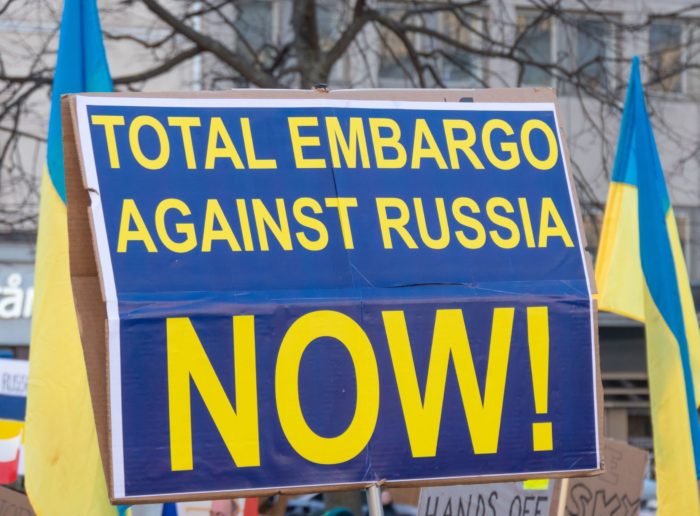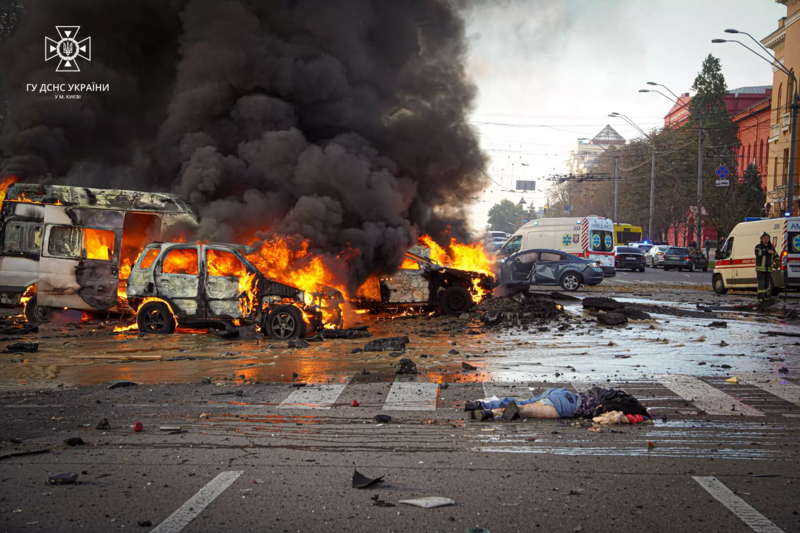The Kyiv-based think tank StateWatch specializes in reforming government agencies by the principles of good governance, has identified 24 Russian arms manufacturers involved in the production of missiles and other weapons systems used in Russia’s invasion of Ukraine that are still not sanctioned by the UK, the US, nor the EU.
Russia's invasion of Ukraine on 24 February prompted an immediate and extensive round of sanctions against the country's arms industry.
- The UK moved to sanction Russia's largest defense company, Rostec. They also imposed sanctions on Russia's largest supplier of air and sea missiles, Tactical Missile Corporation, and Uralvagonzavod, one of the world's largest tank manufacturers.
- Meanwhile, the EU banned its member states from doing business with arms manufacturer Almaz-Antey, nuclear submarine maker Sevmash, and Rostec. The EU also banned exporting technology to JSC Kalashnikov. The company is the original manufacturer of the well-known AK-47 assault rifle and Russia's largest firearm manufacturer. The Kalashnikov Group accounts for 95% of the country's machine guns, sniper rifles, pistols, and other firearms production.
24 of Russia's arms producers still not under sanctions
However, 24 Russian weapons manufacturers are still unsanctioned.
Among the unsanctioned companies identified by StateWatch is NPO Novator, the manufacturer of the Kalibr cruise missile. Russia used this missile to level Ukrainian cities to the ground.
Vladivostok-based shipbuilding company Vostochnaya Verf is also among the unsanctioned. Vostochnaya Verf manufactures the Serna-class landing craft used during Russia's assault on Zmiinyi (Snake) Island.
Here is the full list of Russian weapons producers not targeted by EU, US, or UK sanctions, according to StateWatch.
|
COMPANY |
TIN |
STATUS |
|
RESEARCH DESIGN BYURO "NOVATOR": Manufactures Kalibr missiles |
6673092045 |
AWAITING SANCTIONS; Mentioned in the American BIS List |
|
IZHEVSK ELECTROMECHANICAL PLANT "KUPOL": Manufactures the Tor air defence system |
1831083343 |
|
|
RS-LIZING: Manufactures the Tachion UAV |
1832003703 |
|
|
MACHINE BUILDING COMPANY "VITYAZ": Manufactures the DT-30 armoured vehicle |
261013879 |
|
|
ZAVOLZHSKIJ ZAVOD GUSENICHNYH TYAGACHEJ: Manufactures the GAZ-3344-20 Aleut armoured vehicle |
5248031980 |
|
|
CENTRAL RESEARCH INSTITUTE BUREVESTNIK: Manufactures 120 mm mortar |
5259075468 |
|
|
VOSTOCHNAIA VERF: Manufactured the Serna-class landing craft |
2537009643 |
|
|
A.E. NUDELMAN DESIGN BUREAU OF PRECISION MACHINE BUILDING: Manufactures the Strela-10 air defence system |
7728789425 |
|
|
NAUCHNO-PROIZVODSTVENNOE OBEDINENIE RUSSKIE BAZOVYE INFORMACIONNYE TEHNOLOGII: Manufactures the APE-5 command points |
7726604816 |
|
|
SPECIALNOE KONSTRUKTORSKOE BYURO: Manufactures the Tornado, Grad, and Smerch |
5906034720 |
|
|
KAZANSKIJ OPTIKO-MEHANICHESKIJ ZAVOD: Manufactures optical devices |
1660004229 |
|
|
ENIKS: Maintains aircraft and aircraft engines for the Russian military, as well as manufacturing UAVs |
1661009974 |
|
|
EGO-HOLDING: Involved in the production of the R-330Zh radar |
7804070635 |
|
|
SCIENTIFIC AND PRODUCTION ASSOCIATION STRELA: Manufactures the SNAR-10m1 and Zoopark-1M radars |
7103028233 |
AWAITING SANCTIONS, mentioned in the UK list as a subsidiary of a sanctioned company, but not sanctioned itself |
|
AVTOMOBILNIJ ZAVOD URAL: Manufactures trucks and jeeps |
7415029289 |
|
|
GRUPPA IMPULS: Involved in the production of BTR-82, Tigr, Tigr-M, BREM-Karmouredd vehicles |
7707199873 |
|
|
BRYANSKIJ AVTOMOBILNYJ ZAVOD: Manufactures Tor and Buk air defence systems |
3255502838 |
|
|
KOMMERCHESKIE AVTOMOBILI - GRUPPA GAZ: Manufactures vehicles |
5256051148 |
|
|
ZAVOD TULA: Manufactures firearms and ammunition |
7104002862 |
|
|
RM – TEREKS: Manufactures vehicles |
7707533574 |
|
|
VOLGOGRAD MACHINE-BUILDING COMPANY "VGTZ": Manufactures combat vehicles |
3441023695 |
|
|
STATE CORPORATION FOR SPACE ACTIVITIES "ROSKOSMOS": Involved on space flight and aerospace research |
7702388027 |
|
|
SPECIAL MECHANICAL BUILDING AND METALLURGY "MOTOVILIHINSKIE ZAVODY": Manufactures firearms and ammunition |
5906009273 |
Absent from Ukraine’s National Agency on Corruption Prevention list |
|
OBEDINENNAYA MASHINOSTROITELNAYA GRUPPA |
7722470978 |
Absent from Ukraine’s National Agency on Corruption Prevention list |
StateWatch also found that sanctioned Russian parent companies sometimes managed to lure investments via unsanctioned subsidiaries.
"These findings confirm that prominent Russian arms manufacturers have escaped consequence for their continued contribution to the unprovoked, illegal invasion of Ukraine. These 24 entities continue to operate unhindered by targeted sanctions, which is critical in enabling Russia's war atrocities," Hlib Kanievskyi, Head of Research at StateWatch, stated,
He added,
"It is vital that the unified effort to counter the Russian war machine extends to these entities. They cannot be allowed to continue enabling the Russian armed forces to perpetrate their crimes in Ukraine."
The report by StateWatch follows an investigation conducted by Reuters in July, which uncovered that despite the extensive sanctions imposed on Russia's defense industry, nearly three dozen leaders of Russia's arms firms and at least 14 defense companies have yet to be sanctioned by the UK, the US, or the EU. Concurrently, the investigation revealed inconsistencies in the application of sanctions against arms manufacturers and tycoons across NATO member states. For instance, some governments imposed penalties, and others did not.
The Reuters investigation found, for example, that Alan Lushnikov, the largest shareholder of JSC Kalashnikov Group, remains unsanctioned. This is despite the fact that the US imposed sanctions on the company in 2014 in response to Russia's illegal annexation of Crimea. Reuters uncovered the same story regarding Almaz-Antey, whose CEO, Yan Novikov, remains unsanctioned.
CEOs of Russia’s largest military concern are still sanction-free
Although the number of civilians killed remains unknown, it is estimated to be in the tens of thousands. According to the United Nations Human Rights Office,
“Most of the civilian casualties recorded were caused by the use of explosive weapons with wide area effects, including shelling from heavy artillery, multiple launch rocket systems, missiles, and air strikes.”
Russian army gets new T-80BVM tanks despite western sanctions
Despite skepticism, sanctions work
Some commentators suggest that Western sanctions against Russia's military-industrial complex have done little to deter its hostilities in Ukraine. This may be true to a certain extent. Given President Vladimir Putin's predatory ambitions and determination to destroy the Ukrainian nation and state, sanctions are unlikely to deter Russia's aggression.
However, sanctions rarely have an immediate impact. They also rarely stop a dictator in his tracks, forcing him to reassess. Instead, sanctions aim to starve the Russian government of much-needed funds by stifling the country's economy and destroying its industrial capacity. The ultimate goal of the sanctions is to hamper Russia's war efforts in the long run.
Evidence that existing sanctions are working is plentiful. Sanctions have rendered Russia incapable of manufacturing and repairing tanks, forcing it to sift through old storage and reintroduce Soviet-era tanks. Russia has had to rely on Iran
for new drones. An intelligence update by the UK Ministry of Defence indicated that Russia was increasingly relying on inefficient weapons systems due to running short of more precise modern missiles.
Another intelligence update suggests that Russia's defense industry is
"probably incapable of producing advanced munitions at the rate they are being expended."
Russia's recent shambolic mobilization has also sent men to the front with rusty Kalashnikovs. Meanwhile, Russia's puppet "Luhansk People's Republic" has sent conscripts to the front armed with 19th-century rifles. Moreover, according to declassified US intelligence reports, Russia, a supposed "great power," has turned to North Korea for millions of artillery shells and rockets.
Instead, Ukraine has handed Russia multiple humiliating defeats. This includes:
- forcing Russia to abandon its assault on Kyiv
- sinking the Moskva, its Black Sea Fleet's flagship
- and, most recently, partially destroying the Kerch Strait Bridge.
The strategic genius of Commander-in-Chief of the Armed Forces Valerii Zaluzhnyi and Commander of the Ukrainian Ground Forces Oleksandr Syrskyi is primarily responsible for Ukraine's recent successful counteroffensives in Donbas, Kharkiv, and Kherson Oblasts.
In addition, one cannot help but conclude that the gradual crippling of Russia's arms industry has also played a role.
Nonetheless, if Ukraine is to reclaim its land, entities, and individuals that continue to fuel Russia's war machine must be sanctioned.
The imposition of direct sanctions on arms manufacturers and their subsidiaries is only a part of the picture. Captured Russian equipment by Ukrainian forces has revealed that the Russian military relies heavily on dual-use Western components.
For example, the Russian-made Borisoglebsk-2 mobile jamming system contained sophisticated parts from the UK, the US, Germany, South Korea, Taiwan, and the Netherlands. The UK components included multiple high-frequency transistors. This is an example of a "dual-use" technology, which can serve both civilian and military purposes. The regulations tend to be lax and riddled with loopholes for dual-use items.
Although the UK banned the export of all dual-use items to Russia in March, the move came a little too late. According to the London-based Royal United Services Institute (RUSI) report, Russia's arms industry relies more heavily on western-origin components than previously believed. The report states that
“Russia’s latest weapons are heavily dependent upon critical specialist components manufactured abroad.”
How to finally stop “Putin’s favorite factory” from producing cheap tanks
Going beyond imposing embargoes: close cooperation and whole society approach

Dr. Daniel Salisbury, the Senior Research Fellow at King's College London, whose research focuses on arms embargoes, said
that history had shown that
“the adaptive and deceptive nature of Russia’s illicit procurement networks is challenging to contend with.”
Dr. Salisbury suggests that Western states "go beyond simply imposing embargoes." Western states should work closely with international partners and neutral states to counter Russia's use of "third-country" control evasion hubs. He adds that efforts need to be made to engage industry in Western industries, which are required to comply with export controls but may lack the intelligence and expertise to understand Russia’s evasion methods.
Dr. Salisbury also stresses the need for a whole-society approach, in which The approach suggests that non-governmental actors, including researchers, journalists, academics, and industry, should work together to shed light on Russia's illicit procurement networks.
On the morning of 10 October, every Ukrainian oblast received air raid alerts. Russia attacked Kyiv's city center for the first time since the beginning of the war. It was deliberately targeting cultural sites. Missiles struck one of Kyiv's busiest intersections during the morning rush hour. This was the central intersection of Vulytsia Volodymyrska and Bulvar Shevchenko. It is located at the northwest entrance to Shevchenko Park. Russia did not strike a single military target. It has achieved nothing from a strategic military standpoint. Yet, they have deliberately timed the attack to coincide with many Ukrainians' morning commute to work.
The real goal of Russia’s unprecedented missile strike on Ukraine
By noon, Russia has launched 83 missiles and rockets across several Ukrainian cities in a nearly six-hour-long barrage. At least 19 civilians were killed.
According to reports and video evidence, Kalibr cruise missiles were used. Its manufacturer, the Yekaterinburg-based NPO Novator, was sanctioned by the US in 2017 but remains unsanctioned by the UK, EU, and other Western states. The NPO Novator's CEO, Farid Abdrakhmanov, also remains unsanctioned.
Russia continues to slaughter Ukrainian civilians and destroy their cities. In the meantime, the wheels at NPO Novator's manufacturing plants continue to turn and churn out more Kalibr missiles.
 Klaidas Kazak is a British civil servant and a graduate from the School of Slavonic and East European Studies at University College London.
Klaidas Kazak is a British civil servant and a graduate from the School of Slavonic and East European Studies at University College London.
Read more:
- European Council sanctions vessels transporting Russian oil at price above price cap
- EU’s 8th Russia sanctions package has oil price cap, falls beneath Kyiv’s expectations
- US officials admit frustrations that Russia sanctions have been slow to bite – CNN
- Russian coal import embargo came into force in the EU and the UK
- The EU oil embargo is not enough. How to curb Russia’s petroeuros
- How to finally stop “Putin’s favorite factory” from producing cheap tanks
- CEOs of Russia’s largest military concern are still sanction-free
- 31 ways Russia evaded sanctions, boosting its war machine

